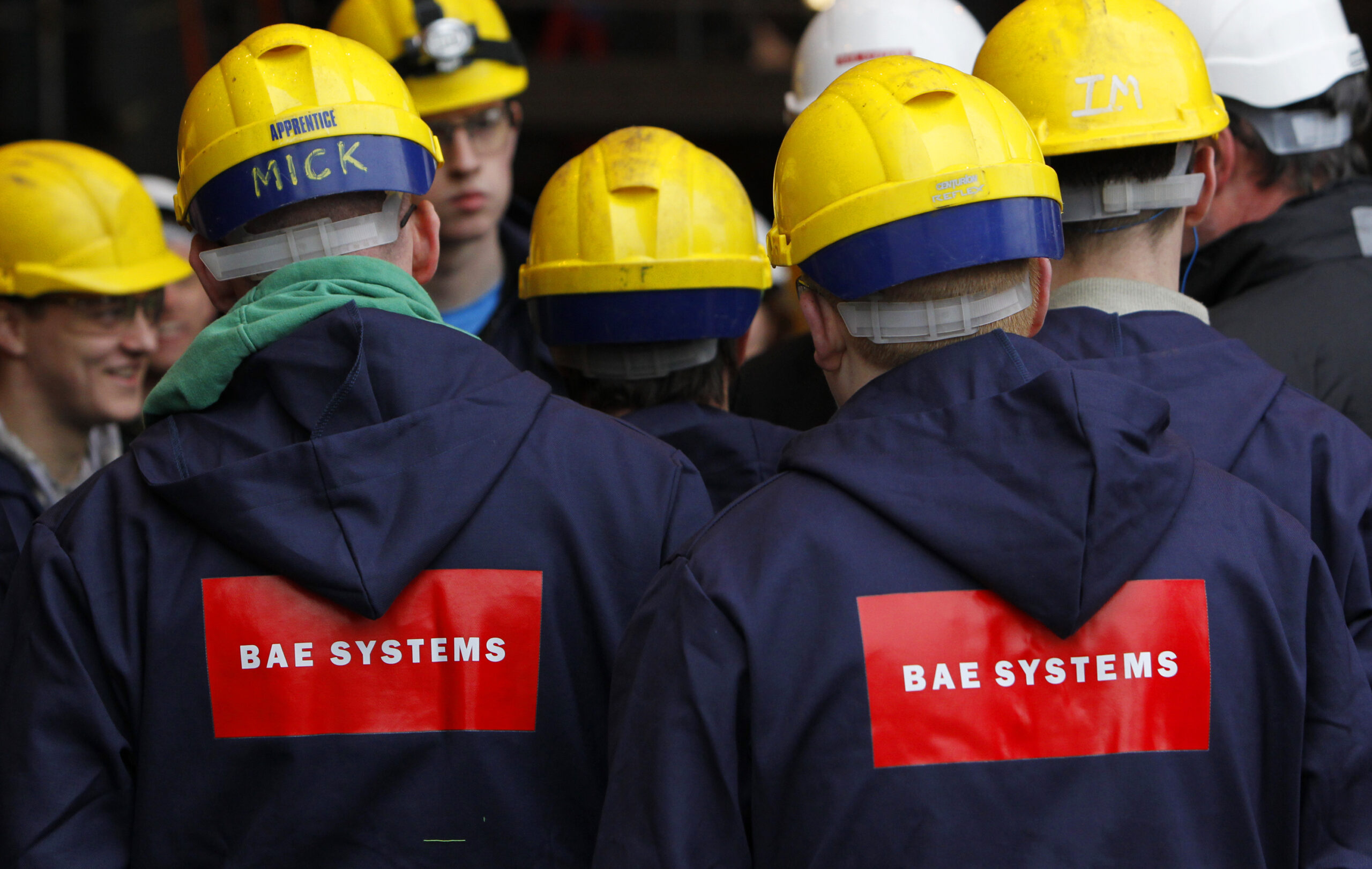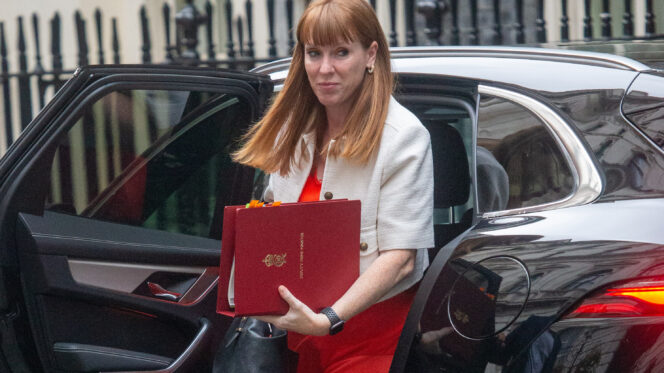Are Unions Finally Changing Their Relationship With the Arms Trade?

“It’s not the weapons I’m here to defend,” said Unite delegate Andrew Holland during a debate on arms spending at this year’s trade union congress. “It’s the jobs.”
The idea that unions’ support for workers can be neatly cleaved from their support for what workers produce – particularly in the case of defence and fossil fuel industry workers – has a long history in trade unionism. At the same time, members’ lives are not confined to the workplace. As we face climate catastrophe and proliferating warfare, the tension between the worker and their work – the sectional and general – is becoming increasingly untenable for organised labour.
That tension came to a head at this week’s Trades Union Congress (TUC) in Brighton, where representatives from 48 trade unions considered a motion on “wages not weapons” that demanded congress “prioritise campaigning for public investment in Britain’s public realm, decimated by austerity” over an increase in defence spending, in a break with previous TUC policy.
The motion argued that increased defence spending is not a zero-sum game, but that “ever-higher expenditure on arms will inevitably mean less money for our education, health, and councils, and the green transition”.
Following a rare moment of disagreement in an otherwise publicly courteous conference, a narrow majority of TUC delegates backed the motion, overturning TUC policy that committed to campaigning for increased defence spending.
A fractious movement.
Jo Grady, general secretary of the University and College Union (UCU), moved the motion. “It is not good enough for us to say jobs first,” she told congress. “Not when the result of those jobs is that hell is rained down elsewhere. We must have better ambitions than that.”
The motion was supported by the National Education Union (NEU), the civil servants’ union PCS, the Communication Workers Union (CWU), arts and entertainment union Equity, the National Union of Rail, Maritime and Transport Workers (RMT) and the Fire Brigades Union (FBU).
Voting against the motion were Unite, GMB and Prospect, all of whom have members in defence, and are likely anxious that any lapse in support for arms spending would see members leave to join another union.
Mike Clancy, Prospect general secretary, said that “division … is at the heart of the UCU motion”.
“We’ve heard a lot about solidarity over the last few days,” Clancy added. “It sounds to me like that doesn’t apply to defence workers.
“The reality is that there are dreadful events around the world: Russian aggression in Ukraine; the humanitarian disaster in Palestine. That doesn’t mean that defence workers don’t make a vital contribution and are part of a public good.
“If this [motion] is carried, what the media will say is that [TUC] congress does not support defence workers. That solidarity is a selective notion. That defence workers are an embarrassment to the trade union movement.”
Tony Kearns, the CWU’s senior deputy general secretary, condemned Clancy’s euphemising about “the humanitarian disaster in Palestine”: “It’s not a humanitarian disaster,” he told congress. “It is a genocide supported by this government, using British workers to fly planes and kill innocent men, women and children. Let’s call it what it is. Don’t come up here with mealy-mouthed words.”
Flip-flopping.
The union movement has struggled to carve a clear path in its approach to defence spending in recent years. In 2017, the TUC passed a motion committing to campaigning for defence diversification, where workers transition away from military work to alternative skilled employment. But five years later, unions voted to “condemn” the “run-down” of UK defence manufacturing, and to campaign for an “immediate increase” in defence spending – a move Grady recently said had “put [the trade union movement] on the wrong side of history”.
A lot has changed since 2022 to challenge the union movement’s support for defence, however – Israel’s genocide in Gaza, for one, which workers around the world have sought to disrupt.
Putting pressure from the opposite direction is the increasing support for defence spending from the Labour party, with which the union movement is closely tied. Speaking at a BAE warship-building shipyard in early June, Keir Starmer unveiled a new defence review that would transform Britain into a “battle-ready, armour-clad nation”. He announced that billions would now be spent – the largest increase in defence spending since the end of the cold war – on weapons.
Unite general secretary Sharon Graham welcomed Starmer’s announcement as “critical for our future defence.” Graham, whose agenda has been to shift the union away from lobbying Westminster and “back” to the “core business” of protecting jobs, said she would work to ensure Labour sticks to its promise of “translating defence spending into British growth, British jobs, British skills, British innovation”.
The more rightwing GMB also welcomed the pledged increase in defence spending, calling it a “powerful force domestically for growth and levelling-up in our regions and nations”.
You can rebuild industries, but not lives.
This was the context against Tuesday’s debate on the “wages not weapons” played out. Grady said that Labour’s refusal to fund public services while funding massive military expansion was “an anti-worker agenda. It is a direct attack on our interests, class, communities and our movement”.
Pointing out that her own union had members employed in research for the arms industry, she said she would “not tolerate having the movement lectured on the jobs that will be lost with no reference to the lives that are being lost right now. You can rebuild industries … you cannot get back lives destroyed by these weapons.”
Also speaking against the motion was Ian Clarke, a Rolls-Royce worker, who said: “Defence provides skilled work, decent wages and sustains working-class communities like Plymouth, Barrow, Clydeside and Belfast.”
This argument – that defence jobs provide secure work in areas that have otherwise been hit hard by deindustrialisation – was echoed by Unite’s Andrew Holland, who highlighted the “record number” of apprentices in the military manufacturing.
Debates over the implications of military production have been playing out internally within unions. In July, Unite voted at its policy conference to support worker-led campaigns to boycott the handling of Israeli goods, as well as campaigns for divestment from Israeli companies.
The vote followed internal debate within the union over its stance on Palestine, with Graham sending a letter last March to union staff and organisers that there was “no contradiction for a trade union to hold a position of solidarity with Palestinian workers, while at the same time refusing to support campaigns that target our members’ workplaces without their support”.
It continued: “The ‘first claim’ on our priorities is always the protection and advancement of our members’ interests at work.”
Absent a broader governmental industrial strategy – evidenced by the chaotic closures of Port Talbot, Luton’s Vauxhall plant, and Grangemouth – and in the absence of a clear plan for a just transition, trade unions are keen to hold on to remaining decent unionised jobs, including those in the defence sector.
“No doubt, on the eve of its abolition,” Grady wrote in the Morning Star, “the union for hangmen also decried the end of capital punishment.”
Polly Smythe is Novara Media’s labour movement correspondent.


